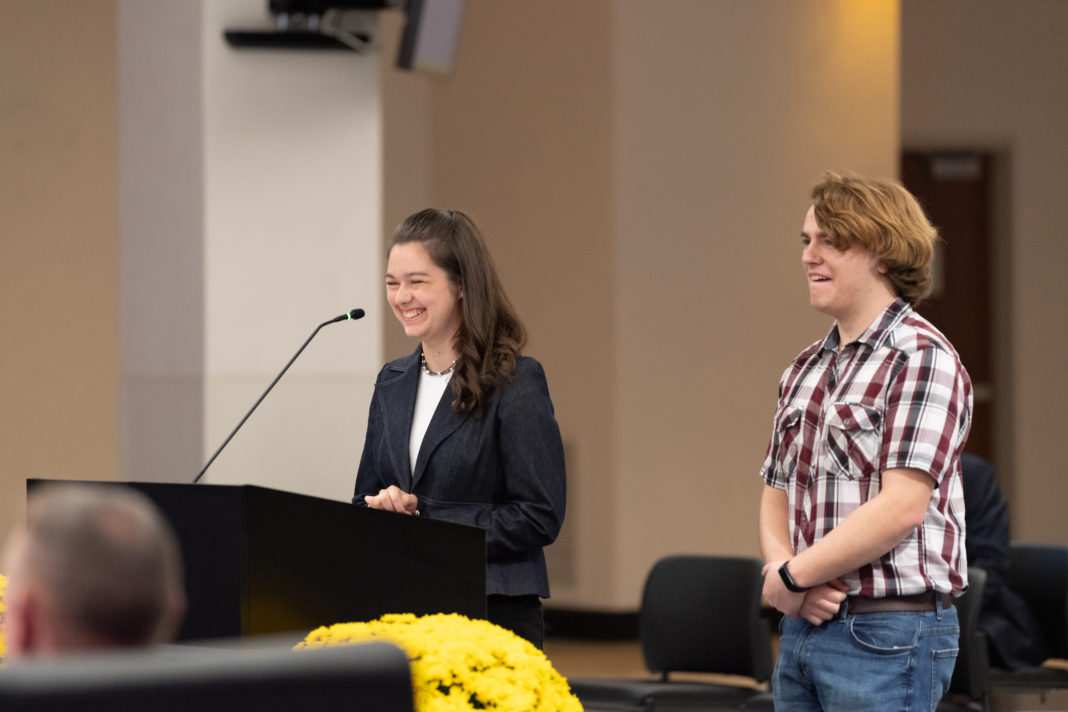Pictured – Emma Fontenot, left, and Jackson Taylor, both National Merit Scholarship finalists, shared a light moment with the Tennessee Tech Board of Trustees at the October meeting.
Board approves request to state for funding of a new academic classroom building
Cookeville – At the quarterly Board of Trustees meeting, Tennessee Tech University announced it has hit a record high for its graduation rate and an increase in the freshman retention rate. The Board of Trustees also approved the university’s efforts to obtain state funding for a new academic classroom building and a new Bachelor of Science degree in music.
Graduation rates hit record highs
In his report to the board, Tech President Phil Oldham announced that Tech’s graduation rates have hit a new high, with the 6-year rate hitting 60.2% for students who started in Fall 2016. This bested last year’s record of 59.9% and demonstrates a continued dedication to graduating students on time.
Other items in Oldham’s report included freshman retention rates, external research funding, fund raising and capital projects on campus.
The 78.5% freshman retention rate increased by 5.6% over last year, coming back to pre-pandemic levels and back on track to achieve the university’s goal of 82%.
He also shared that Tech set a new record for external research funding at $23.65 million and had the largest non-capital campaign fundraising year at $20.96 million.
Building on campus continues. Two major capital projects have ongoing construction: The Ashraf Islam Engineering Building and the Parking and Transportation Improvements projects. Four other capital projects were mentioned as being in active development: Johnson Hall renovation and Foster Hall demolition, the Advanced Construction and Manufacturing Engineering building, the J.J. Oakley Innovation and Residence Center and Tucker Stadium.
“This is the good story we have to tell,” Oldham said. “Through diligence and strategic work from the entire campus – faculty, staff and student – we are making progress towards our student success goals and shepherding the State of Tennessee’s investment in the future of our students.”
New B.S. in Music degree
The board approved a new Bachelor of Science in Music degree program, which will be housed in the School of Music in the College of Fine Arts. The new degree program is designed to serve students who wish to pursue a music degree and have a career in the varied fields in the music industry.
“This new degree program is designed to serve incoming students who may come in with significant college credits, either by transferring to Tech or coming to Tech as a freshman with dual-enrollment credits earned while still in high school, and students who want to earn a degree in music but want the flexibility that a Bachelor of Science degree offers,” said Provost Lori Mann Bruce.
In preparing the degree proposal, School of Music faculty saw a growing need for a new program that provides students with greater flexibility in the classes they take, broader content, and training for careers that don’t fit the traditional models of music education and performance.
“The purpose of this program is to broaden the educational opportunities and graduation pathways for students seeking an accredited degree in music,” said Colin Hill, director of Tech’s School of Music.
Pending final approval from the Tennessee Higher Education Commission later this year, students will be able to enroll in the new music degree program as early as next spring.
State capital funding request for new academic classroom building
Tech will seek funding in the 2023-2024 state budget for a new academic classroom building to demolish and replace Matthews, Daniel and Crawford halls. The proposed facility is 91,000 square feet and will provide classroom, faculty office and support spaces for the College of Education and the College of Arts and Sciences. It has a projected cost of $66.5 million. The state-required match is $5.3 million, of which one-third must be from private gifts.
The university also disclosed a capital project that will be entirely funded through private giving, the Football Operations Center. The $15 million project has reached the halfway point in fundraising and is required to be officially disclosed as a capital project to the state in order to be able to proceed to the design phase.









